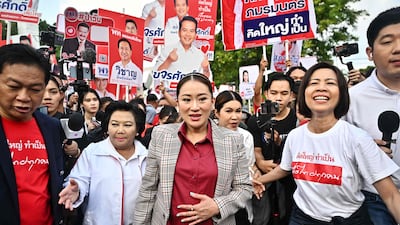Just two weeks before Thailand holds its general election, Paetongtarn Shinawatra, one of the leading candidates to be the country’s prime minister, gave birth to a baby boy. Was it a hopeful augury, a sign that Thailand’s turbulent politics might be about to forge a fresh new start?
Well, it’s possible. But equally the focus on the 36-year-old face of the Pheu Thai party, daughter of the self-exiled former prime minister Thaksin Shinawatra, reminds many of the real question about this election: will the cycle of parties associated with Mr Thaksin winning at the polls, only to be forced out of office by military coups, finally be broken?
For this has been the pattern since 2001, when Mr Thaksin first came to power in a landslide victory. Although the names of his political parties have changed, as the courts dissolved two of them, his followers have topped the polls in every election since. But in 2006, he was overthrown by the armed forces, and later sentenced in absentia to two years in jail for abuse of power (a ruling he disputes as politically motivated). His sister Yingluck was elected as prime minister in 2011, but was ousted by the military in 2014 and also sentenced to jail in absentia. Another Thaksin-linked premier was disqualified from office by the courts for hosting a cooking show on television, and the country has been ruled by the former head of the Thai armed forces, Prayut Chan-o-cha, since 2014.

Pheu Thai is way ahead in the opinion polls, with 41 per cent backing it in a survey released last Saturday – more than double the second-placed Move Forward party on 19 per cent. But that doesn’t guarantee the premiership to either Ms Shinawatra or the other two candidates announced by the party. The 500-member lower house is fully elected, but the prime minister will be chosen in conjunction with the senate, whose 250 members are entirely appointed by the military. This means Pheu Thai would have to win 376 seats to overcome the expected veto by the senate, a highly unlikely target well beyond the party’s own probably over-optimistic projection of 310 seats.
So there are considerable hurdles for Pheu Thai, despite its huge support in the rural north and north-east, where Mr Thaksin’s policies of subsidies and cheap health care made him wildly popular. But the conservative, royalist and business elites who saw Mr Thaksin and his successors as irresponsible populists who threatened the fabric and stability of the country won’t have it easy, either. The main conservative parties – including the one Mr Prayut belongs to – are all polling at below 10 per cent; and in any case, under the 2017 constitution Mr Prayut would have to stand down as prime minister by 2025 should he manage to stay in office due to term limits.
Some kind of accommodation may seem the obvious answer. While Pheu Thai may be more aligned to the progressive Move Forward party, it is the conservatives they need to reassure and whose backing they will need. Mr Thaksin has been doing his bit by announcing that he wants to go home, and is prepared to go to jail as long as he can spend the rest of his time with his family. And while both Pheu Thai and the military’s allies may find a pact unpalatable, they only have to look to next-door Malaysia to see how two coalitions that spent the past two decades demonising each other managed to form a unity government that has held since last November.

If, on the other hand, Pheu Thai returns without reaching out to its long-running opponents, then “the seeds for the next coup, either military or judicial, may have already been sown”, as Australia National University’s Greg Raymond recently wrote. Coups are often relatively peaceful in Thailand, but there have been far too many of them in the century since the country became a constitutional monarchy in 1922 – estimates vary, but commonly accepted numbers are 12 successful coups and seven that failed over that time.
Some argue that when countries have a history of coups, people become accultured to them. This reminds me of a friend at school in the 1980s who said about his country: “Whenever you wake up in the morning and hear someone on the radio saying, ‘my fellow citizens’, you think, ‘oh, there’s been another coup’.”
But Thailand’s coup-prone history is not a matter for levity – not by this point in the 21st century. Of the five countries that founded the Association of South-East Asian Nations in 1967, the other four – Indonesia, the Philippines, Singapore and Malaysia – are well-established, if often fractious, democracies. It isn’t that coups haven’t been attempted in those four, but it is certainly settled that such seizures of power would cause uproar and ought to belong to the history books, not to the present day.
Thailand once stood out in the region as the only country in South-East Asia to manage to resist colonialisation. For the sake of its own future, leaders from all parties need to compromise and end this troubling cycle. The military establishment is guaranteed its place at the table with control of the senate. It is surely time for the rest to be decided by the ballot box.


